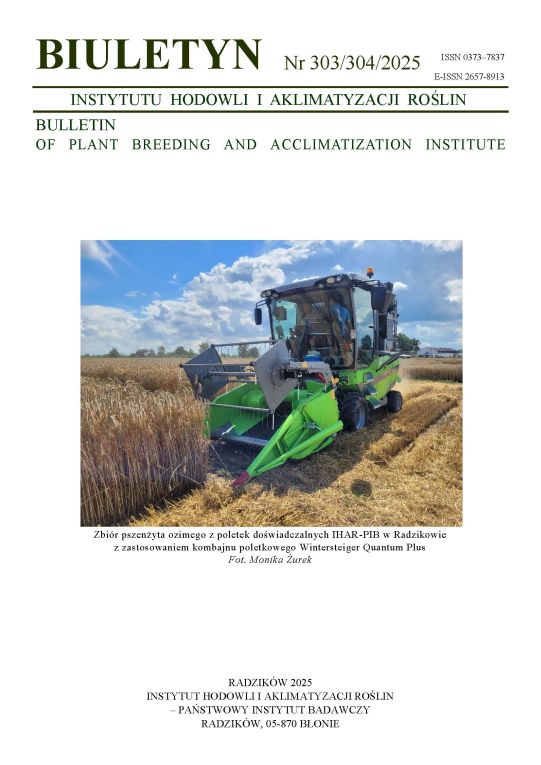Influence of nitrogen fertilization on yield and tubers quality in new cultivars of starch potato
Kazimierz Jabłoński
k.jablonski@ihar.edu.plZakład Nasiennictwa i Ochrony Ziemniaka w Boninie, Instytut Hodowli i Aklimatyzacji Roślin w Radzikowie (Poland)
Abstract
In the years 2001–2003, the effect of nitrate fertilization on yield and some quality features of three new high-starch potato cultivars: Neptun, Pasja and Skawa was evaluated in the field experiments carried out on medium-heavy soil. The highest (48.6 t·ha-1) and the lowest (44.8 t·ha-1) tuber yields were obtained with cv. Neptun and cv. Pasja, respectively. The highest starch content (10 t·ha-1) was recorded in cv. Skawa, whereas the lowest one (8.9 t·ha-1) in cv. Pasja. There was no direct correlation between nitrogen fertilization and starch yield in the cultivars under study. In cv. Neptun, the highest starch content was obtained at an N dose of 150 kg·ha-1, while in cvs Pasja and Skawa at 100 kg·ha-1. In cvs Neptun and Skawa, the increase in an N dose up to 150 kg·ha-1 resulted in the increasing number of tubers with hollow centre and rust internal spots. In contrast, no disease effects of increasing N doses were observed with cv. Pasja. The plants of cv. Neptun appeared to be highly susceptible to common scab, especially at higher doses of N fertilization.
Keywords:
nitrate fertilization, potato, potstarch cultivarsato, starch yield, tuber yieldReferences
Baumgärtel G. 1995. Stückstoffendüngen zur Kartoffeln. Kartoffelbau 1/2: 30 — 33.
Google Scholar
Bernat E. 2001. Optymalne nawożenie azotem nowych odmian skrobiowych ziemniaków na glebach średnio zwięzłych. Ziem. Pol. 1: 9 — 13.
Google Scholar
Choroszewski P. 1994. Praktyczne zalecenia ochrony ziemniaka. Inst. Ziemniaka, Bonin.
Google Scholar
Czuba R. 1986. Nawożenie. PWRiL, Warszawa.
Google Scholar
Jabłoński K. 1998. Nawożenie ziemniaków. Wydaw. Fundacja “Rozwój SGGW”.
Google Scholar
Jabłoński K. 2002. Agrotechnika i mechanizacja produkcji ziemniaków skrobiowych. Praca zbiorowa. Ekonomika i technologia produkcji ziemniaków skrobiowych. Wydaw. Wieś Jutra: 97 — 111.
Google Scholar
Kaczorek S., Wierzejska-Bujakowska A. 1988. Wymagania nawozowe 32 odmian ziemniaka. Ziemniak 45 — 59.
Google Scholar
Rembeza J. 2002. Czynniki kształtujące opłacalność produkcji ziemniaków skrobiowych. Praca zbiorowa. Ekonomika i technologia produkcji ziemniaków skrobiowych. Wydaw. Wieś Jutra: 54 — 60.
Google Scholar
Trawczyński C. 2001. Wpływ rzutowego i rzędowego nawożenia mocznikiem na wysokość plonu i niektóre cechy jakości bulw. Biul. IHAR 220: 221 — 226.
Google Scholar
Authors
Kazimierz Jabłońskik.jablonski@ihar.edu.pl
Zakład Nasiennictwa i Ochrony Ziemniaka w Boninie, Instytut Hodowli i Aklimatyzacji Roślin w Radzikowie Poland
Statistics
Abstract views: 92PDF downloads: 23
License
Copyright (c) 2005 Kazimierz Jabłoński

This work is licensed under a Creative Commons Attribution-ShareAlike 4.0 International License.
Upon submitting the article, the Authors grant the Publisher a non-exclusive and free license to use the article for an indefinite period of time throughout the world in the following fields of use:
- Production and reproduction of copies of the article using a specific technique, including printing and digital technology.
- Placing on the market, lending or renting the original or copies of the article.
- Public performance, exhibition, display, reproduction, broadcasting and re-broadcasting, as well as making the article publicly available in such a way that everyone can access it at a place and time of their choice.
- Including the article in a collective work.
- Uploading an article in electronic form to electronic platforms or otherwise introducing an article in electronic form to the Internet or other network.
- Dissemination of the article in electronic form on the Internet or other network, in collective work as well as independently.
- Making the article available in an electronic version in such a way that everyone can access it at a place and time of their choice, in particular via the Internet.
Authors by sending a request for publication:
- They consent to the publication of the article in the journal,
- They agree to give the publication a DOI (Digital Object Identifier),
- They undertake to comply with the publishing house's code of ethics in accordance with the guidelines of the Committee on Publication Ethics (COPE), (http://ihar.edu.pl/biblioteka_i_wydawnictwa.php),
- They consent to the articles being made available in electronic form under the CC BY-SA 4.0 license, in open access,
- They agree to send article metadata to commercial and non-commercial journal indexing databases.
Most read articles by the same author(s)
- Michał Kostiw, Kazimierz Jabłoński, The impact of nitrogen fertilization on the tuber yield and quality of table potato varieties cultivated on medium soil , Bulletin of Plant Breeding and Acclimatization Institute: No. 267 (2013): Regular issue
- Kazimierz Jabłoński, Influence of nitrogen fertilization on potato yield and quality of new potato table varieties cultivated on medium-heavy soils , Bulletin of Plant Breeding and Acclimatization Institute: No. 232 (2004): Regular issue
- Kazimierz Jabłoński, Agronomic effects of usage of new machines for potato cultivation , Bulletin of Plant Breeding and Acclimatization Institute: No. 220 (2001): Regular Issue













